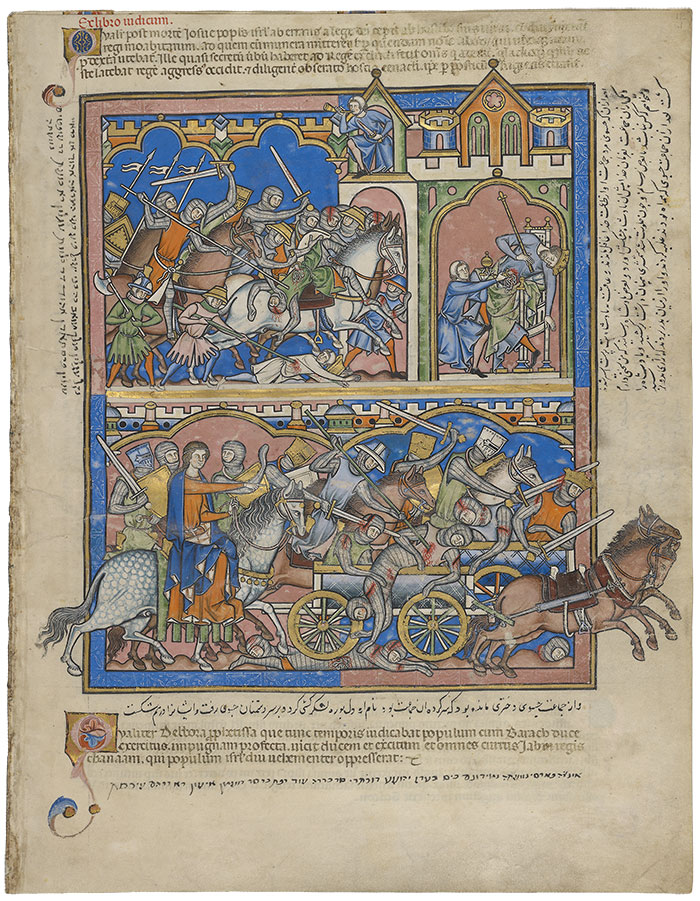
Ehud, a Clever Leader, Deborah, a Prophetess
Old Testament Miniatures with Latin, Persian, and Judeo-Persian inscriptions
Purchased by J.P. Morgan (1867–1943) in 1916
Ehud, a Clever Leader
After the death of Joshua, Israel falls into sin and displeases the Lord; as punishment, the people are made subservient to Eglon, king of the Moabites, for eighteen years. The people repent and plead with the Lord for a deliverer. The Lord chooses Ehud of the tribe of Benjamin. When the Moabite army departs to fight a foreign battle, clever Ehud gains a private audience with Eglon and brutally slays the king. Ehud escapes and summons the Israelite army with a trumpet. The Moabites are humbled. (Judges 3:20–30)
Deborah, a Prophetess
Following Ehud's death, the sins of the Israelites again displease the Lord. The people are made to suffer under the rule of Jabin, king of the Canaanites, for twenty years. Finally, the prophetess Deborah summons Barak to lead an attack against the Canaanite army. Deborah, riding side-saddle on a dappled charger, commands Barak and the Israelite forces. The exhausted and terror-stricken enemy offers no resistance even as its king receives his death blow. (Judges 4:8–16)
Folio 12r (Latin)
Upper half: From the Book of Judges. How, after the death of Joshua, the people of Israel began to stray from the law of God and to be subdued by their enemies and served the king of the Moabites for a long time. Now, when they sent gifts to him, through the agency of one, Ehud by name, who was able to use both hands for his right he, as if to have a word in secrecy with the king, dismissed all those who were present, approached the king and killed him with a dagger which was hidden under his clothes. Then, having carefully locked the doors of the parlor, he went out through the porch and escaped. (Judges 3:7–30)
Lower half: How Deborah the prophetess who was in those days judging the people with Barak the captain of the army, set out to battle and defeated the captain, the army, and all the chariots of Jabin, the king of Canaan, who had mightily oppressed the people of Israel. (Judges 4: 1–16)
Folio 12r (Persian)
Upper right margin: After Joshua died, his people slackened in their obeisance to God and were finally enslaved by an idolater king. And by the command of God, one of the disciples brought gifts before that king and told the king, "I have a word to deliver and would want no one present when I deliver it." And when it [the room] was cleared, he drew the sword he was hiding and slew the king. After that, the accompanying community of Joshua took over and rescued him [the killer] so he was not harmed.
Lower half: And there was a girl amongst the people of Joshua who was the leader of that group and her name was Delbureh [Deborah]. She levied an army and descended upon the enemies of Joshua and defeated them.
Folio 12r (Judeo-Persian)
Upper left margin: The tale of Eglon, king of Moab, when the Children of Israel sent a gift along with Ehud from Eglon. During the private [interview] he [Ehud] killed Eglon [as] it is written in Judges.
Lower half, beneath Latin: I do not know what is written in Persian.
Then, after Joshua, a girl became leader, she attacked the enemy and defeated them.
Italicized words are in Hebrew.
Content consultant: Richard Leson
Persian translated by Sussan Babaie
Judeo-Persian translated by Vera Basch Moreen
Latin translation by Eran Lupu
After the commentary volume accompanying the Fine Art Facsimile edition by Faksimile Verlag Luzern
